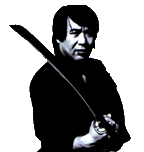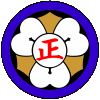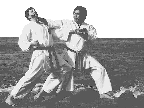Our Philosophy
 Our
philosphy is an essential part of the arts
we teach—arts that have their origins in the need to
protect private property and agricultural production
following the Taika land reforms implemented in Japan in 645 AD.
The bushi (武士) began as guardians of property
owners and farmers, the people whose work was vital to
their nation's survival. Over the next few centuries
the bushi evolved into the samurai (侍) as we know them today—to the point that the two terms became almost synonymous.
A thousand years of risking and sacrificing their lives
for the benefit of those unable to protect themselves
resulted in the development of a philosphy and code of
conduct that has become known around the world as Bushidō (武士道).
Our
philosphy is an essential part of the arts
we teach—arts that have their origins in the need to
protect private property and agricultural production
following the Taika land reforms implemented in Japan in 645 AD.
The bushi (武士) began as guardians of property
owners and farmers, the people whose work was vital to
their nation's survival. Over the next few centuries
the bushi evolved into the samurai (侍) as we know them today—to the point that the two terms became almost synonymous.
A thousand years of risking and sacrificing their lives
for the benefit of those unable to protect themselves
resulted in the development of a philosphy and code of
conduct that has become known around the world as Bushidō (武士道).
Bushidō is a profound, complex, and challenging philosophy of life, but its essence is embodied in the seven fundamental precepts for which it is most widely recognised:
• Gi (義) Morality, Righteouness, Ethics
• Yū
(勇) Courage, Valour, Bravery
• Jin
(仁) Benevolence, Compassion, Kindness
• Rei
(礼) Respect, Politeness, Etiquette
• Makoto
(真) Sincerity, Faithfullness, Honesty
• Meiyo
(名誉) Meritorious, Honour, Reputation
• Chūgi
(忠義) Loyalty, Devotion, Commitment
• Jisei
(自制) Self-Mastery (self-control and self-discpline combined)
These are the key attributes upon which our instruction focuses. Training in true budō accomplishes more than merely acquiring the skills to defend oneself or others. It fundamentally transforms the mind, body, and spirit! It alters one's perceptions and perspectives of life and the world in which we live. Training in classical budō is more than an activity, sport, or hobby. It becomes a Way of Life that ... (full article here)




